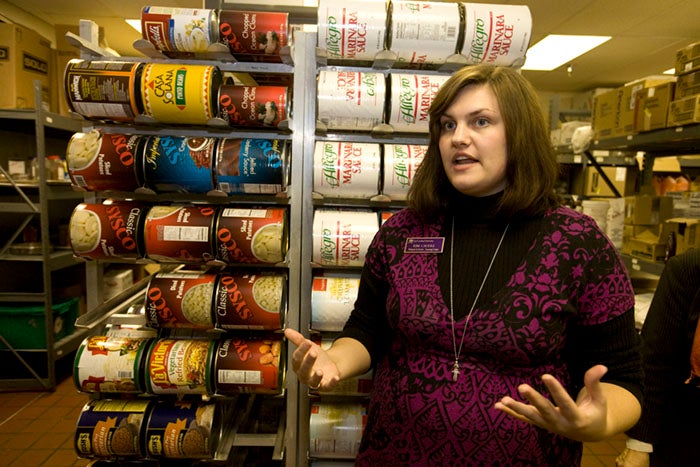New Campus Kitchen will bring hunger relief to Pitt County

During a tour of Campus Kitchen’s new home at Todd Dining Hall, Kim Caudle explains how the project will cut food waste and address hunger. ECU News Services photo by Cliff Hollis
GREENVILLE, NC — East Carolina University this week became the first college in the UNC system to open a Campus Kitchen, a project that will bring student-powered hunger relief to Pitt County.
ECU’s Volunteer and Service-Learning Center and Aramark opened the kitchen on Feb. 24 at Todd Dining Hall. Using surplus food from campus dining halls, student volunteers will prepare and deliver nutritious meals to those in need through partnerships with Ronald McDonald House and the Little Willie Center.
“I believe that when we feed the hungry in our community, especially children, we not only strengthen their bodies but their minds,” said Sarah Schach, a member of Campus Kitchen’s ECU leadership team.
Initially, CKECU will package and deliver meals at least once per week. Each meal will consist of a protein, vegetable, starch and dessert. Meals are planned by a Serv-Safe certified student leadership team under the supervision of the VSLC and Aramark, and delivered to adults and children at partnering locations at no cost.
Mike Lysaght, resident district manager for Aramark, said the company welcomed the partnership. “The big question I get asked all the time is, ‘What do you do with all that leftover food?’ I finally have an answer,” he said.
CKECU joins a national network of 20 other colleges and universities and one high school to fight hunger. “After a great deal of anticipation, I am very excited to see the Campus Kitchen become a reality here at ECU. The opportunities for students and community partners to be involved in this project are countless,” said Kelly Pippin, CKECU leadership team member.
The students became involved through the VSLC. More than 11,000 students are registered at the VSLC, and students performed more than 161,700 hours of community service last year.
A study released this month by the Food Bank of Central & Eastern North Carolina and Feeding America, the nation’s largest domestic hunger-relief organization, found that more than 545,000 people receive emergency food each year through the FBCENC and its network of agencies. Twenty-nine percent are children.
To learn more about the Campus Kitchens Project, visit www.campuskitchens.org.